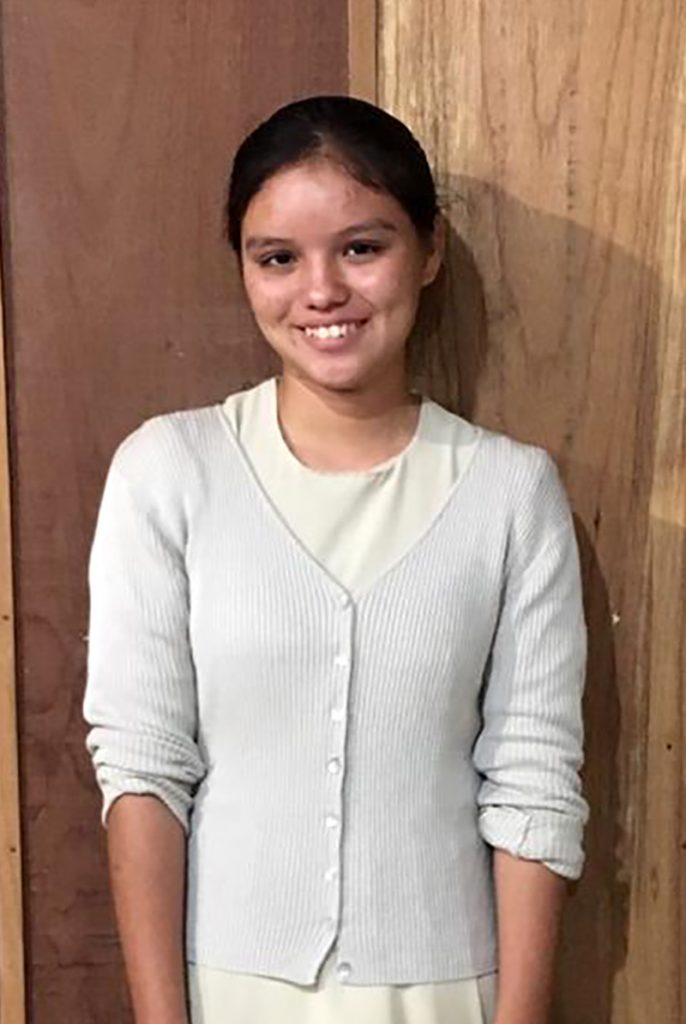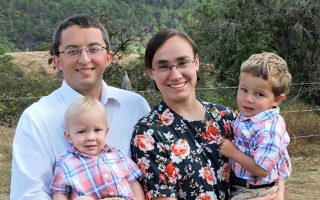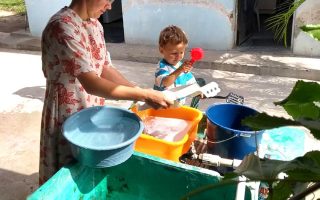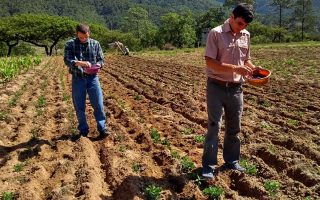Dealing With the Blind Spot
Have you ever puzzled over something for a long time and suddenly, the solution becomes glaringly obvious? We quickly think, How could I not have noticed that before? Or, How could I have been so blind?
After we mentally scold ourselves for our stupidity, we share our puzzle with someone else, grinning inside and wondering, How long will it take them to figure this out? To our chagrin they see right through it very quickly! (Not great for self-esteem.)
Did you know that each of your eyes has an area called the blind spot? Within the retina is a small portion of the visual field that corresponds to the position of the optic disk. There are no photoreceptor cells in the optic disc, and therefore, this area has no image reception. The blind spot of the right eye is located to the right of the center of vision, and vice versa in the left eye. With both eyes open, the blind spots are not perceived because the visual fields of the two eyes overlap. Even with one eye closed, the blind spot can be difficult to detect due to the brain’s ability to “fill in” or ignore the missing portion of the image.
One way to detect this is to draw a small x in the center of a four-inch square of paper. Then, closing your right eye, fix your gaze on the right edge of the paper and move it closer or farther away until the x disappears.
Your eye is a very sensitive member of your body and will not tolerate abuse without responding with pain. It requires special protection and care, which is why we have eyebrows and eyelashes to create shading and keep trash from entering. (Not just for looks, as many women seem to think.) The reason we blink reflexively up to 28,000 times a day is to lubricate and cleanse our eyes. Consciously or subconsciously, much is done to protect our eyesight.
The Bible uses examples from the human body to illustrate truth, and the eye is no exception. Speaking of how to relate to our own faults, Jesus used the illustration of the mote and the beam. He also said, The light of the body is the eye: if therefore thine eye be single, thy whole body shall be full of light. But if thine eye be evil, thy whole body shall be full of darkness. If therefore the light that is in thee be darkness, how great is that darkness! Both passages relate to spiritual blindness, but in the last verse, especially note how Jesus laments the sad state of those who mistake the darkness within them for light and fall into self deception. Self-deception is the natural result of someone who stubbornly refuses to accept his own blind spots.
The truth is that we all have blind spots. As much as we hate to admit it, others often see clearly things that we are oblivious to. Often this is not a matter of intelligence, but rather a host of variables that affect each person’s perception; things like upbringing, occupation, life experience, training, opportunity, age, and gender.
On the bright side, these blind spots need not be our undoing. Just as with physical eyesight, in which each eye compensates for the blind spot in the other, in a spiritual sense we can also receive the same benefits. Paul spoke of the different members of the body, including the eye, to illustrate how the church should work together in harmony. One member compensates for the other. This is not an excuse for our weakness; rather it is a hope for our spiritual survival.
No doubt we have all been on both the giving and the receiving end of this mutual compensation. Sometimes it’s hard to admit our blindness; at other times it’s difficult to be patient with others who “just don’t get it.” Perhaps we deal with a slow learner in school or difficult neighbors or a coworker or maybe a brother or sister in church. How do we respond? Perhaps we should ask ourselves how we would like to be treated if the tables were turned. When I consider God’s patience toward my shortsightedness, my own attitude toward others’ blindness is often reshaped. For with the same measure that ye mete withal it shall be measured to you again.
Humility and a desire for spiritual growth are keys to overcoming our blind spots; pride and self assurance will surely foster blindness. A humble person does not try to prove himself to be someone, will readily receive helpful criticism, and will benefit from the advice given him. A proud person hates to admit his weaknesses and precariously sets himself up for a downfall.
Recently in Sunday school we were discussing the early church controversy about circumcision. Some in the early church were convinced that it was necessary, while others seemed to support it because of peer pressure, including the Apostle Peter. I was struck with the thought that here was a prime opportunity for disunity and division. Peter had charisma. He had been mightily used by God and was well-known and respected within the church. He had a religious party very willing to back him. Was it easy for Peter to admit his fault when Paul confronted him “before them all”? What would church history be, and what long-lasting effects would still be alive today if Peter had stubbornly refused to accept the criticism to save face? Would not the two parties exist to this day? Peter’s apparently humble response to the rebuke, admitting his blind spot, is an example we all do well to follow.
So, my fellow “eyes,” consider the following proverbs. For a just man falleth seven times, and riseth up again: but the wicked shall fall into mischief. Reprove not a scorner, lest he hate thee: rebuke a wise man and he will love thee. Give instruction to a wise man, and he will be yet wiser: teach a just man, and he will increase in learning.
I firmly believe it is not God’s intention that we be deceived and blinded. One miracle that Jesus often performed was the physical healing of the blind. I believe this was no coincidence; it seems so symbolic of the spiritual scales that God removes from the eyes of those who are open and receptive to the truth. Consider Paul’s experience, and remember that the key to overcoming lies in our attitude. May we reflect a “Paul” attitude when “Ananias” comes to visit us.
The Spirit of the Lord is upon me, because he hath anointed me to preach the gospel to the poor, he hath sent me to heal the brokenhearted, to preach deliverance to the captives, and recovering of sight to the blind, to set at liberty them that are bruised. Luke 4:18
~ Nick Suarez
- Justin and Lynnae Zimmerman and family
- Washing dishes at the pila
- Home in Mixcolajá
- Farming the local way- planting peanuts between the bean rows_
A Typical Day in an Abnormal Life
Our day might start anytime between 5:30 and 7:00 a.m., depending on when our two little boys wake up. In our house there are no sound barriers, and every sound travels through the whole house. You can’t even roll over in bed without everyone knowing it! So when two happy little boys wake up and start talking and laughing, everyone just considers more sleep to be out of the question.
Mornings tend to be a little rushed, especially for me as a mother of two boys (Terell, 2 1/2 and Caleb, 1). I try to get breakfast ready by 7:00. The two teachers, Nick Suarez and Joy Zimmerman, leave for school before 8:00. Things don’t always settle down after that, though. Mornings consist of doing wash, making the one-hour drive to and from the nearest market for fresh produce once a week, baking, or just general house upkeep.
Justin volunteered to take the school students home in the pickup so they don’t have to walk in the heat. He leaves at 12:00 when school ends, and we have lunch right after he gets back.
Things get pretty quiet for the next few hours as the boys—and often the adults—enjoy an afternoon siesta. Supper is served anytime between 5:00 and 7:00, depending on what is going on, who is coming for supper, or if we have to leave early for a service.
We eat a variety of American and Guatemalan food, but lunch is always rice and beans, sometimes with tortillas, and always “solo Español!” Those who resort to speaking English get the privilege of washing the lunch dishes.
As a mother, my life consists of doing many of the same things that I did in the States, but with some different twists—like learning how to do without running water for a week at a time, or learning to cook with fewer and different ingredients. And trying to train and nurture two rather rowdy little boys under the constant scrutiny of the two singles living with us.
There are perks to living where we do: beautiful temperatures, year-round flowers, cheap fruits and vegetables that are readily available, and being able to wash dishes outside.
Every week we have four church services: Sunday morning and Sunday afternoon services at our local church, one service at a church an hour away on Sunday evenings, and a Wednesday night service here as well. There may be requests to have an evening service with a family or a person who is struggling.
We have also made it a goal to have company into our home once a week and to have the youth over for supper once a month (in addition to being with them every Friday afternoon).
There are currently twenty-two members in our church, but Sunday morning attendance is usually around forty. We have found the church people to be very friendly and welcoming, willing to teach us “gringos” how to do life here. Most of all, we see in them a strong love for their Lord and a hunger to learn more about Him. And that is really what we want our life to consist of and our reason for being here: to lead these dear people to a deeper and closer walk with Jesus… one day at a time.
~ Lynnae Zimmerman
Living With COVID-19 in Guatemala
Guatemala, like the rest of the world, is living with the effects of COVID-19. It has affected everyone—the president of Guatemala, the person who living and working in the city, and the campesino living far from town or city.
As of April 17, 2020, there are 214 confirmed cases of COVID-19 in Guatemala with seven deaths. Many of the confirmed cases have recovered. There are thousands of people in quarantine.
The government has put many measures in place to control the pandemic. I believe the official document of restrictions is sixteen pages long, but I will list a brief summary of the restrictions currently in place.
-No gatherings of more than 10 people. Schools, churches, and sporting events are closed.
-A curfew is enforced from 4 p.m. to 4 a.m. Everyone must be in their house. During the day people are allowed out for food, medicine, etc. Most businesses are closed.
-No travel is permitted between departments of the country by air, land, or water.
-Everyone, without exception, must wear a face mask in public.
-People over sixty years old are told to stay home. Everyone is encouraged to stay home as much as possible.
-All borders are closed and international travel has been suspended. Some countries, through their embassies, have arranged flights back to their respective countries. Some visitors, as well as mission personnel, have used this means to get back to the USA and Canada.
This has really limited our work here in Guatemala. No church services, no school classes, no visiting, and no travel. Most construction projects are at a standstill. Many towns have blocked their roads, and anyone traveling must explain their reason for entering or leaving the town. Missionaries and native leaders are stuck at home. Many people cannot work.
In the local congregation, an effort has been made to keep in touch by phone, WhatsApp, and e-mail. People send encouraging messages, thoughts, and songs. Prayer requests are shared, and prayer and fasting are encouraged. Victor Ovalle and the church in San Cristobal have made Sunday “services” available by conference call. Participation in these services is growing and is available to all the congregations who wish to participate. Usually there is an opening, a devotional, and a message. Effort is ongoing to improve call quality, and the sound has improved.
The longer the shutdown continues the more challenging life becomes. Missionaries have come to Guatemala to minister, visit, build, travel, and teach, but this focus has changed a lot in the last month. We still have so much to be thankful for. We have an almighty God who is in control. He has promised to never leave us nor forsake us. We can live in victory and continue to share the good news of the Gospel. Loneliness and discouragement are real and need to be dealt with in a proper way. I believe our staff and church leaders are doing well, but we do ask for your prayers.
~ Wesley King

Nora on the day of her baptism
Nora’s Baptism
“Buenas tardes! Buenas tardes!” The members of Iglesia Menonita Rio de Agua Viva in Santa Rosita greeted one another as they filed into the church and filled the benches. March 6, 2020, was a cool, dreary day, but it could not dampen the joyful hearts of those gathering for Hermana Nora’s baptism. After several hymns, Dean led out in devotions and Isaias preached a message pertaining to baptism. Some of the Scriptures he referred to were Matthew 28:18-20, Acts 2:38-40, and 1 Peter 3:21. And then Nora was baptized.
The church was nicely filled with all the regular attendees along with several visitors who came for the special occasion. After the service, there was cake and coffee for all.
Nora Montenegro is 16 years old. Nora has the huge blessing of having her mother, older sister, and twin sister faithfully serving God. We now have seven native members in the church here. Remember them in your prayers.
~ Yvonne Zimmerman
Baptism in Porvenir
Sunday, March 15, was a special day for the congregation here in Porvenir—three individuals received water baptism. Although it was a joyous day, there was also an ache in our hearts that two who began instruction class didn’t continue to follow Jesus.
We were blessed with the three who followed through. A young man named Gonzalo and his sister Betsabé were baptized. They are blessed to have both their parents and two other sisters as part of the church.
Claudia, a twenty-nine-year-old mother whose husband has been a Christian for a few years, was also baptized. It is a blessing to have another couple serving the Lord together.
Pray for them as they continue growing into the image of Christ.
~ Wes Hursh
Goodbye, Houseparents
Today, April 17th, the folks at mission headquarters said goodbye to their “parents.” Irvin and Eleanor Martin have served as houseparents there for the past two years and are moving back to their home in central Pennsylvania.
Irvin and Eleanor had planned to leave on March 26, but due to COVID-19, their tickets were canceled. They were delighted to learn about an available flight leaving today, which was much sooner than they had thought possible.
Irvin and Eleanor will be greatly missed by young and old alike. Thank you for your service with MAM, and for being parents and grandparents to many of the MAM staff families.
Larry and Larisa plan to move to mission headquarters to temporarily fill in as houseparents until the next ones are able to arrive.





